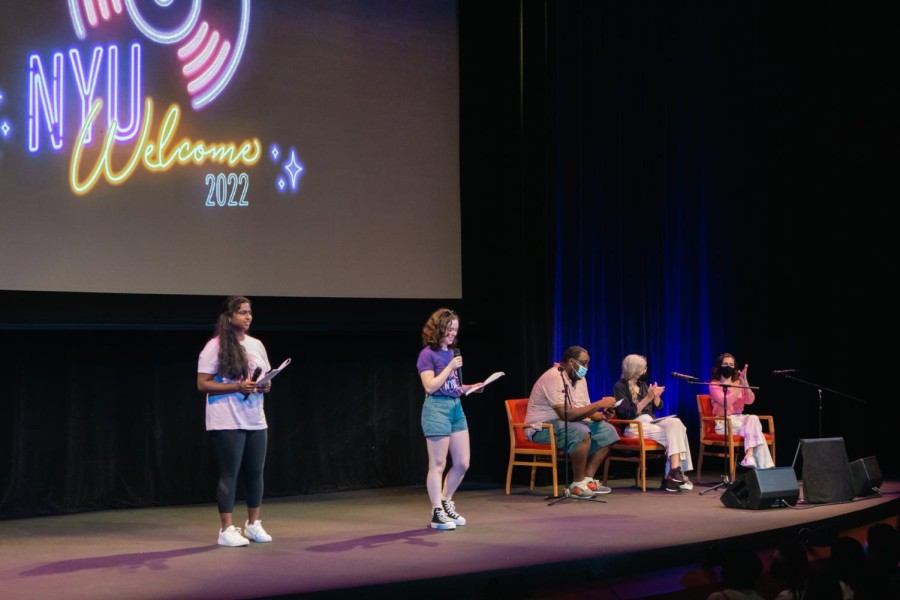Incoming filmmakers show why cinema matters at NYU Welcome Film Festival
The NYU Welcome Film Festival is an annual event for first-years and transfer students to showcase their films.
The Welcome Week Film Festival gave undergraduate filmmakers the opportunity to feature their works on the big screen. (Kevin Wu for WSN)
September 5, 2022
Despite theaters fighting low attendance and audiences exhausted of big budget cookie-cutter films, NYU students have shown that the future of film is bright. On Aug. 28, students filed into NYU’s first Welcome Week Marquee event and film event of the school year — the NYU Welcome Film Festival — to watch the work of first-year and transfer students. Two different shows were moderated by Selma Thompson, Sònia Victoria Werner, Florence Barrau-Adams and Jason Pollard. After each screening, all of the moderators provided feedback on the film’s acting, sound, cinematography and narrative.
“[The best films are a] combination of a great script and actors committed to bringing the story to life,” said senior Tisch Drama student and festival judge Sònia Victoria Werner.
The first-place winner in the first round of showings was Jason K.L.’s self-starring, one-person show, “That’s How Late You Are.” The film was a relatable, patronizing conversation between two friends discussing the reason for one character’s late arrival. The two Jasons are contrasts of each other, with one being punctilious and the other inattentive. However, neither veer far from the primary question: Why are you late? The single action is a pastiche of “Seinfeld,” and as K.L. described the film, a “simpleton dichotomy.” The repetitive dialogue came from K.L.’s improvisation of the script during production. As such, K.L. said “the film was made on the cutting room floor,” where he played a ghost director.
The second-place winners showed that the judges liked the taste of portentous chefs. Lulu Chen’s “Happy Birthday” is a film about a girl trying to impress her dyspeptic parents with her elaborate cooking. The cinematography infused a sweet taste that lasts to the closing credits.
Earning second place in the second showing, with mind-bending visual effects that rival those of “Stranger Things,” was Christopher Kosakowski’s “Active Ingredient.” The film follows a chef who travels to a monochromatic dimension to retrieve magical fruits that spice up his otherwise terrible cooking while narrowly evading an offscreen Demogorgon-esque monster.
In third place for the judges, but in what seemed like first place for the audience, John Bray’s dark film “The Jeweler” follows the routine of the titular jeweler crafting a ring as each day inches closer to an anniversary event. In a brisk twist, the jeweler never gets the chance to give the ring to his partner — he softly sets the ring on a tombstone. Bray said he chose this ending in his Tisch application.
“The happy ending is overdone,” Bray said. “If they get mad and upset, they’ll remember you.”
Many students chose to focus their films on issues they hold close to their hearts. Sadie Kopacz’s “Lomar Farms” follows her beekeeper aunt as she relates how bees’ endangerment puts ecosystems at risk. In “PseudoKhristos,” William Yeh shows vengeful students soaking the hallowed halls of their religious boarding school with kerosene, a Brontë-esque chef-d’œuvre that brings abuse into the light.
Angus Ebeling’s “Black Prayers Matter” won first place in the second Marquee showing. Ebeling came up with the story for his film, when a local church in his neighborhood of Oakwood, California, was torn down to build a mansion. The First Baptist Church of Venice was an integral community sanctuary for many people who were otherwise marginalized, especially African Americans settling in Venice. The documentary plays out as a conversation between two of Ebeling’s neighbors. He ties the event to broader issues of the Black Lives Matter movement.
“This is my community and my neighborhood,” Ebeling said. “If you see something, you have to speak up.”
Through two showings at NYU Welcome Film Festival, new film students have exhibited their talent — which will only grow stronger as they work towards graduating at NYU.
“It takes a lot of courage for you to put your stuff out there.” Werner said. “Art is a reflection of you. We want to see it.”
Correction: A previous version of this article misspelled Jason K.L.‘s last name. The article has been updated to reflect the correction. WSN regrets the error.
Contact Caitlyn McConnell at [email protected]
























































































































































